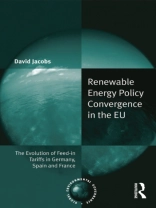This book examines the coordination of renewable energy policies in the European Union using an innovative theoretical approach to explain national policy making. David Jacobs asks, why are national support instruments for electricity from renewable energy sources converging, even though the harmonisation of these frameworks at the European level has failed? Which causal mechanisms lead to cross-national policy similarities? And what are the implications for policy coordination in the EU? The author traces the evolution of feed-in tariffs – the most successful and most widely used support mechanism for renewable electricity – in Germany, Spain and France. He reveals increasing cross-national policy similarities in feed-in tariff design – despite the failure of harmonizing instruments at the European level. He explains these increasing policy similarities by applying policy convergence theory. Policy convergence can occur voluntarily, based on transnational communication, regulatory competition and technological innovations and these findings have important implications for European policy steering. The key to this book is the interrelation of an innovative theoretical concept (coordination of policies in the international arena via voluntary cooperation) with a very topical empirical research focus – the promotion of renewable energies in the EU. It will be essential reading for scholars and students of environmental policy, comparative politics and European studies.
David Jacobs
Renewable Energy Policy Convergence in the EU [PDF ebook]
The Evolution of Feed-in Tariffs in Germany, Spain and France
Renewable Energy Policy Convergence in the EU [PDF ebook]
The Evolution of Feed-in Tariffs in Germany, Spain and France
Mua cuốn sách điện tử này và nhận thêm 1 cuốn MIỄN PHÍ!
Ngôn ngữ Anh ● định dạng PDF ● Trang 312 ● ISBN 9781317066316 ● Nhà xuất bản Taylor and Francis ● Được phát hành 2016 ● Có thể tải xuống 3 lần ● Tiền tệ EUR ● TÔI 4868342 ● Sao chép bảo vệ Adobe DRM
Yêu cầu trình đọc ebook có khả năng DRM












